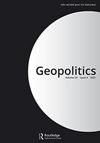全球契约中的地缘政治:主权、新兴规范和全球移民治理中的虚伪
IF 3
1区 社会学
Q1 GEOGRAPHY
引用次数: 0
摘要
《安全、有序和正常移民全球契约》(GCM)和《难民问题全球契约》(GCM)于2018年获得联合国大会通过。经过近五年的时间,现在是时候对推动谈判、协议和实施的地缘政治利益进行批判性反思了。本期特刊的目的是批判性地审视各国如何利用《全球契约》通过移民外交实现其战略利益。每篇文章都试图质疑和质疑全球契约中提出的假设、逻辑和修辞,以及由此产生的国家和国际组织的实施。本期特刊还强调了在《全球契约》框架下,国家对妥善管理移民负责的新规范,以及在不驱回、国内流离失所和气候移民问题上明显的沉默。本期特刊的作者努力了解全球契约在实施五年后的今天所存在的差距、虚伪和矛盾。这篇介绍性文章列出了本期特刊的主要问题,以及我们的主题、概念和贡献。披露声明作者未报告潜在的利益冲突。可持续发展目标10.7.2。中国,“中国代表团团长、中国驻摩洛哥王国大使李力大使的发言”,通过《安全、有序和正常移民全球契约》政府间会议,马拉喀什,2018年12月11日,https://www.un.org/en/conf/migration/assets/pdf/GCM-Sta tements/ China .pdf。本文章由计算机程序翻译,如有差异,请以英文原文为准。
The Geopolitics in the Global Compacts: Sovereignty, Emerging Norms, and Hypocrisy in Global Migration Governance
ABSTRACTThe Global Compact for Safe, Orderly and Regular Migration (GCM) and the Global Compact on Refugees (GCM) were adopted by the UN General Assembly in 2018. After nearly five years, it is time for a critical reflection on the geopolitical interests that motivated the negotiations, agreements, and implementation. The purpose of this special issue was to critically examine how states used the Global Compacts to achieve their strategic interests using migration diplomacy. Each article attempts to question and problematise the assumptions, logics, and rhetoric put forward in the Global Compacts and resulting implementation by states and international organisations. The special issue also highlights the emerging norm of state responsibility for well-managed migration within the Global Compacts, and the notable silences around non-refoulement, internal displacement, and climate migration. The authors in this special issue worked to understand the gaps, hypocrisy, and contradictions in the implementation, now five years after the adoption of the Global Compacts. This introduction article lays out the driving questions for the special issue, along with our main themes, concepts, and contributions. Disclosure statementNo potential conflict of interest was reported by the author(s).Notes1. SDG target 10.7.2. China, ‘Statement of Ambassador Li Li, Leader of the Chinese Delegation and Chinese Ambassador to the Kingdom of Morocco’, Intergovernmental Conference to Adopt the Global Compact For Safe, Orderly and Regular Migration, Marrakesh, 11 December 2018, https://www.un.org/en/conf/migration/assets/pdf/GCM-Sta tements/china.pdf.
求助全文
通过发布文献求助,成功后即可免费获取论文全文。
去求助
来源期刊

Geopolitics
Multiple-
CiteScore
7.60
自引率
10.30%
发文量
50
期刊介绍:
The study of geopolitics has undergone a major renaissance during the past decade. Addressing a gap in the published periodical literature, this journal seeks to explore the theoretical implications of contemporary geopolitics and geopolitical change with particular reference to territorial problems and issues of state sovereignty . Multidisciplinary in its scope, Geopolitics includes all aspects of the social sciences with particular emphasis on political geography, international relations, the territorial aspects of political science and international law. The journal seeks to maintain a healthy balance between systemic and regional analysis.
 求助内容:
求助内容: 应助结果提醒方式:
应助结果提醒方式:


